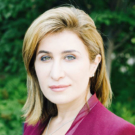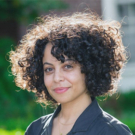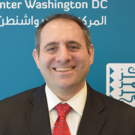Speakers

Bessma Momani
Professor of Political Science
University of Waterloo
Moderator
About the Webinar
On March 31, Arab Center Washington DC (ACW) held a webinar titled “Russia’s War in Ukraine and Its Impact on the Middle East.” Panelists were Heba Gowayed, Assistant Professor of Sociology, Boston University; Bessma Momani, Professor of Political Science, University of Waterloo; Yousef Munayyer, Non-resident Senior Fellow, Arab Center Washington DC; and Kristian Coates Ulrichsen, Baker Institute Fellow for the Middle East and Non-resident Senior Fellow at ACW. ACW Executive Director Khalil E. Jahshan moderated the event.
Bessma Momani looked at the economic impact of the war on food security and the energy sector in the Middle East. She said that food security will be a serious concern in the region as many countries (such as Lebanon, Egypt, Tunisia, Jordan, Libya, and Yemen) are heavily dependent on Ukrainian and Russian exports of wheat and grains. Egypt, she said, is the largest consumer of these exports that are subsidized for the poor, pointing to possible political and social instability in the country. Momani reminded the audience of the causes precipitating the Arab Spring in 2010-2011 when food insecurity was a serious concern following environmental changes and developments. She emphasized that another version of that spring “is going to happen, is going to come [although] it may not come very soon.” The reality is that so much of the poor live on bread and tea in many Arab countries and any increase in prices or decrease in supply will trigger unpleasant events. Momani used Lebanon as another example of the poor situation of imports from Ukraine and Russia; and that is added to the fact that the country imports 80 percent of its food stuffs.
As for the energy sector, Momani said that Russia is a major producer for the European market and the pivot away from that is going to be very difficult. The United States and western countries in general are in a bind; they have to pivot away from Russia but go to other authoritarian regimes to make up the difference. She said that Saudi Arabia and the United Arab Emirates feel emboldened when the United States comes to them to cover the deficit. This basically forces the United States to avoid criticizing the war in Yemen where the two countries are involved. But, in fact, Saudi Arabia and the UAE actually do not want to accommodate the US because higher energy prices mean more money for them. This results in more assistance and support for the Egyptian regime that in recent days received “enormous amounts” to cover its government bonds. Additionally, Momani concluded, Saudi Arabia is in fact “holding the world hostage” in that it will accommodate demands for lower oil prices only if it gets help in the war on Yemen.
Kristian Coates Ulrichsen focused on the Gulf states’ response to the war on Ukraine, stating that, in general, they were reluctant to take sides. Gulf states seemed to consider the conflict as one in Europe and the Middle East has nothing to do with it. Nonetheless, the optics were unpleasant when Saudi Arabia and the UAE showed preference to Russia and did not take calls from US President Joe Biden. On the other hand, Qatar probably was the closest to a pro-Ukraine position—although it officially did not take a stand—which pleased the United States (also Kuwait and Oman). Ulrichsen mentioned that Qatar’s position as a Major non-NATO ally of the United States may have contributed to this position, which actually may indicate again that there is a split within the GCC on the very important concept of partnership with the United States. He stated that “at least for now, for the Biden Administration, politically the relationship is quite warmer with Qatar, Kuwait, and Oman and cooler with the other Gulf states.”
Ulrichsen added that some of the second-order impacts are related to domestic politics in the Gulf states. More money means that they can be more generous with their populations. But externally, the war with Yemen will worsen because Saudi Arabia and the UAE will feel more emboldened. Generally, Ulrichsen emphasized, there isn’t much consensus among Gulf states about issues, although every state is trying to have things both ways with Russia and Ukraine. He predicted that room for maneuver for these states will shrink slowly as the world becomes more polarized. The ultimate question, he said, is whether the Gulf states decide to go with authoritarian rule and Putin or with economic power and security with the United States. It is a difficult choice, especially that they have been quite worried about what they see as a US pivot away from the Gulf. The Afghanistan withdrawal has made them think that nothing prevents the United States from just packing up and leaving the Middle East. In essence, he said, they are hedging their bets and think that maybe they want to have better relations with Russia and China to prevent being left undefended.
Heba Gowayed looked at the issue of refugees following the Russian invasion of Ukraine and examined the different treatment they received in European countries as compared to others who had tried to enter Europe from the Middle East. She first discussed the plight of 4.1 million Ukrainians made homeless by the war and its horrific impact, stating that their plight is no different from that of Palestinians, Iraqis, and Yemenis who have had the same fate. She added that the longer the war continues the worse the problem. Gowayed highlighted the fact that European countries built what she called a $350 million wall to prevent brown and black people from entering it but opened its doors to Ukrainians who are Christian and white. She stated that the focus in coverage of refugees is on the larger picture that obscures the systemic racism that is a hidden factor in treating them. She added that the systems of immigration “are structured to dehumanize people”: people from the Middle East comprise a large portion of those kept outside that wall in Europe. Generally speaking, she said, displacement has increased since WWII where there now are 84 million either internally displaced or living in neighboring countries.
Gowayed referenced the situation of refugees on the ground, saying that they live in crowded camps on borders with bare minimum resources. Syria currently has the largest refugee population in the world, living mainly in Turkey and Lebanon. Seventy-five percent of children are missing out on their education; medical facilities and care are lacking; infrastructure is dilapidated. In a sense, it appears that “the world has effectively shut its coffers and its doors to displaced people from the region.” But, Gowayed said, there is no ignoring the refugee crisis around the world or avoiding the fact that they need assistance because the world is interconnected. She also discussed the fact that the racism confronting refugees today is an extension of the colonial legacy that has faced people of the Middle East and elsewhere, pointing out that the Trump Administration eliminated the refugee admission program while the Biden Administration has not succeeded in reinstating it. She ended her presentation by asserting that the rejection and denial of refugees from the Middle East has always been because of the lack of political will to address their plight.
Yousef Munayyer focused his presentation on a comparison between what is happening in Ukraine and the Palestinian-Israeli conflict. He pointed out that one important effect of the current war is relegating the Palestinian issue to a much lower position on the list of world priorities. Looking at the Israeli mediation effort between Russia and Ukraine, Munayyer said that it has many reasons. He also said that these reasons account for Israel’s fudging on a clear position on the war. First, there are some 1.3 million Russian Jews in Israel who emigrated after the collapse of the Soviet Union. They are recent immigrants and still have connections to Russia. They also have political power in Israel and cannot be ignored. Second, Israel has had a good diplomatic relation with Ukraine, in addition to the presence of a Jewish population there. Third, there is credence to the argument that Russia’s presence in Syria influences how Israel acts. He stated that “the Russian presence in Syria is a main source of security interest that the Israelis are viewing this situation through.” When Israel strikes Iranian targets in Syria, the Russians turn away; they too have an interest in limiting Iran’s influence in that country. He also brought up the issue of the nuclear negotiations with Iran, saying that the Israelis would like to influence them or stop them altogether.
Munayyer stated that Israel’s position on the Russia-Ukraine matter is of serious import for US-Israeli relations. The fact that Israel’s foreign minister has condemned the invasion while the prime minister has fudged on the issue is a contradiction that will affect the relationship. He added that Israel should want to distinguish itself from others in the Middle East who have not agreed with the US position on Russia. Looking at the short term impact, Munayyer sees the war as affecting the Palestinian issue first and foremost. But in the long term, he said things might change because of the global response and the sanctions that were imposed on Russia. If sanctions work with Russia, then why not working with Israel and Palestine? If norms are to be upheld in the international system, why not uphold them regarding Palestinians? Still, Munayyer concluded that political considerations in the US and around the world point to a high degree of hypocrisy in the way the Palestinian issue is being handled.




